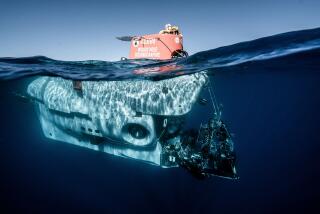Setting to Sea on a Goodwill Mission
- Share via
SAN DIEGO — Under a clear blue sky, the gleaming white ship with huge red crosses on its hull and superstructure sailed Monday on a five-month mission to bring medical care and health education to nations in the western Pacific and Southeast Asia.
The Navy hospital ship Mercy has done disaster relief and war duty, but Monday’s departure marks its first deployment since its maiden voyage in 1987 on a mission that is primarily goodwill, officials said.
Capt. Joseph L. Moore, a physician who is the mission’s commander, said the goal “is to let people see America in a different light.”
The ship will stop in politically volatile nations where some factions are openly hostile to U.S. foreign policy in Iraq and elsewhere: the Philippines, Indonesia, East Timor, possibly Bangladesh and others.
“Terrorism is like an infection. You need to eliminate the medium where it grows,” said Rear Adm. Brian G. Brannman, commanding officer of Naval Medical Center San Diego. “We need to show the truth about America.”
After the December 2004 tsunami, the Mercy deployed for five months to provide assistance in Indonesia, East Timor and Papua New Guinea. Medical personnel performed more than 19,000 procedures on more than 9,500 patients.
Before that mission, the last time Mercy sailed overseas was to care for casualties during the Persian Gulf War in 1990. In the interim, the ship was used to train medical personnel and back up onshore facilities.
The new mission is a follow-up to the tsunami relief mission, which was considered a medical and political success. The ship will visit some of the same locations as the disaster relief mission, such as Banda Aceh, an Indonesian city on the island of Sumatra that was devastated by the tsunami.
Some ports of call will be new, including the four provinces of the Autonomous Region in Muslim Mindanao in the Philippines, according to the government there.
The region has long been a stronghold of violent groups that are dedicated to creating an independent Islamic state. Some of the groups have been linked to Al Qaeda and the kidnapping and murder of Westerners.
As a noncombatant ship under Geneva Convention rules, the Mercy lacks the weapons of a warship. But Navy officials said they have taken unspecified steps to protect the ship and its personnel.
As the 11 a.m. departure time approached, civilian mariners who man the ship rushed aboard, some accompanied to the pier by family members. Most of the medical personnel and supplies will come aboard when the ship reaches Hawaii early next week.
“I’m sorry to see my daddy leave, but I feel good that he’s helping people,” said a small girl, clutching her mother’s hand.
At 894 feet long, the converted supertanker has 12 operating rooms, four X-ray rooms, a dental surgery suite, a physical therapy and burn care center, a pharmacy, and about 1,000 medical beds.
The ship can provide general and eye surgery, medical evaluation and treatment, public health training and even veterinary services. At each stop, host nations and nongovernmental relief agencies such as Project Hope will aid the U.S. effort.
The Mercy, the third hospital ship in Navy history to bear that name, is one of two hospital ships. The Comfort is based in Baltimore and was rushed to New York after the Sept. 11 terrorist attacks.
Most of the overseas locations lack deep-water ports able to accommodate the Mercy.
The ship will have three helicopters to ferry personnel and equipment ashore; the ship has added a helicopter landing pad and hangar bay.
Sailors with a Navy construction battalion from Port Hueneme in Ventura County will travel on the Mercy, helping to build and repair medical facilities during the trip.
Along with Navy doctors, corpsmen and medical technicians, the Mercy will bring a 16-member Navy band and a vocalist from the Navy base in Norfolk, Va. The band specializes in New Orleans jazz, oldies and classic Americana.
“If we can reach people who go away with better thoughts and feelings in their minds about the United States,” said Lt. Cmdr. Ralph Barrett, Atlantic Fleet bandmaster, “that’s a measure of success.”
More to Read
Sign up for Essential California
The most important California stories and recommendations in your inbox every morning.
You may occasionally receive promotional content from the Los Angeles Times.












